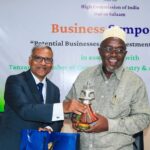Tanzania’s Vice-President Dr. Philip Mpango is urging caution—reminding leaders that the core mission of social security must not be lost in the pursuit of returns.
Speaking at the 14th International Policy Makers Conference on Social Security in Africa, held at the Arusha International Conference Centre (AICC), Dr. Mpango highlighted the importance of safeguarding members’ contributions, especially as more social security institutions invest in large-scale infrastructure projects.
“Investing in infrastructure is important for economic growth,” he said, “but we must strike a careful balance. These funds exist to protect people—especially during times of hardship—not just to build roads and bridges.”
Across the continent, social security schemes are evolving rapidly. Countries like Kenya, Nigeria, and South Africa have been reforming their systems to expand coverage and attract returns through diversified investments. A growing portion of these funds is now being directed into infrastructure, often through long-term projects with delayed payoffs.
However, Dr. Mpango reminded delegates that the primary objective of such institutions is social protection—not speculative profit. To understand the mission of social protection more broadly, explore this ILO definition.
“Social protection is not just about pensions. It’s about economic dignity, shielding families from poverty, unemployment, and health crises,” he emphasized.
Also Read; Over 2,900 Journalists Digitally Accredited Across Nation
In his keynote address, Dr. Mpango proposed four critical pillars to guide social fund managers across Africa:
- Diversify portfolios to balance infrastructure investments with more liquid, income-generating assets.
- Strengthen regulatory oversight, especially in risk-prone sectors like construction and real estate.
- Conduct regular actuarial assessments to evaluate long-term solvency.
- Promote transparency and public trust through independent audits and reporting.
These recommendations echo ongoing global conversations about pension fund governance, especially as countries navigate economic uncertainty, demographic shifts, and the pressure to expand coverage.
In many parts of Africa, less than 20% of the population is covered by formal social security schemes, according to the International Labour Organization (ILO). Most citizens, especially those working in the informal sector, are excluded from pensions, unemployment insurance, or disability support.
As a result, expanding and protecting social security is not just a technical issue—it’s a development priority. Mismanaging these funds could leave millions without a safety net during illness, old age, or economic crisis.
Infrastructure investment remains a promising avenue for long-term returns, but it comes with risks. Poor planning, corruption, and political instability have caused underperformance in some projects. Dr. Mpango warned that illiquid assets and delayed returns can jeopardize a fund’s ability to meet short-term obligations—such as paying retirees or responding to emergencies.
To explore more about infrastructure’s role in economic development, see this World Bank overview.
Dr. Mpango urged African nations to learn from countries that have successfully merged pension investment with public development goals. For instance:
- The Canada Pension Plan Investment Board (CPPIB) uses a diversified model with strict governance.
- Chile’s pension system has evolved over decades to blend private investment with state guarantees.
- Malaysia’s EPF has invested in public housing while maintaining liquidity and transparency.
As the Arusha conference continues, leaders are expected to draft new guidelines on responsible investment and policy innovation. These will help balance the dual roles of social security funds: building infrastructure while providing timely, reliable social protection.
Dr. Mpango closed with a message rooted in both caution and hope:
“Let’s not confuse growth with progress. True progress is measured by how well we protect our people—especially the most vulnerable.”







